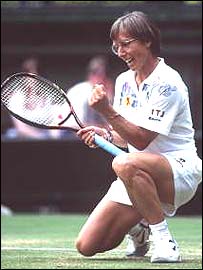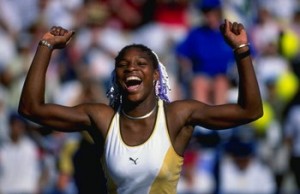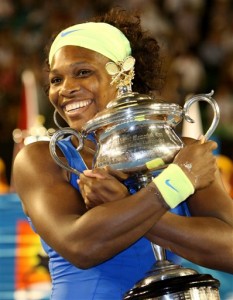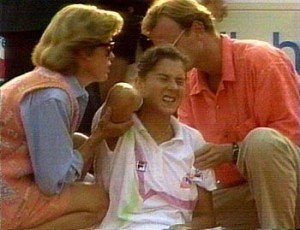Posted on
January 04, 2010 by
Marianne Bevis

Martina Navratilova dominated women's tennis for more than a decade.
Her achievements on the tennis court are almost without parallel.
Her energy in supporting the rights of others has been a constant.
Her passion for the sport that she says “gave her a soul” is unquestioned.
Yet it is one particular interview, following one particularly unlikely event in this tennis icon’s life, that throws as much light on her character as any of those achievements.
Martina Navratilova was a surprise participant, and a surprisingly popular finalist, in the 2008 television show “I’m a Celebrity…Get Me Out Of Here.” And in an interview for the U.K.’s revered Times newspaper, she admitted it was simply the challenge that made her sign up.
“I want challenges, whether cerebral or physical…If you never push yourself, you won’t know what your point of failure is. People always said I was so competitive. Not with other people, with myself.”
This gets to the heart of what made Navratilova one of the most successful women ever to pick up a tennis racket: the need to prove to both herself and the world what was possible.
However, there is a second quote that gets to the heart of what makes her such an enduring, respected, and important woman beyond the tennis court.
“If I feel strongly, I say it. I know I can do more good by being vocal than by staying quiet. I’d have a whole lot more money if I lied, but I wouldn’t have enjoyed spending it.”
This is the story of a courageous, feisty, and generous woman who also happened to challenge political repression and personal prejudice on her way to becoming one of the world’s greatest living athletes.
“You can’t live in the past.”
Navratilova was born in October 1956, in Prague, Czechoslovakia, but her ski-instructor father and her mother divorced when she was still very young.
Tennis ran in her family. Her grandmother had been an international player and, when her mother remarried in 1962, her stepfather became her coach.
By the age of eight, Navratilova reached the semifinals of her first tournament, and her talent began to attract the attention of the Czech authorities.
In 1972, age 15, Navratilova won the Czech national tennis championships. The next year, she reached the quarterfinals of the French Open and the third round of Wimbledon. Read the rest of this entry →










